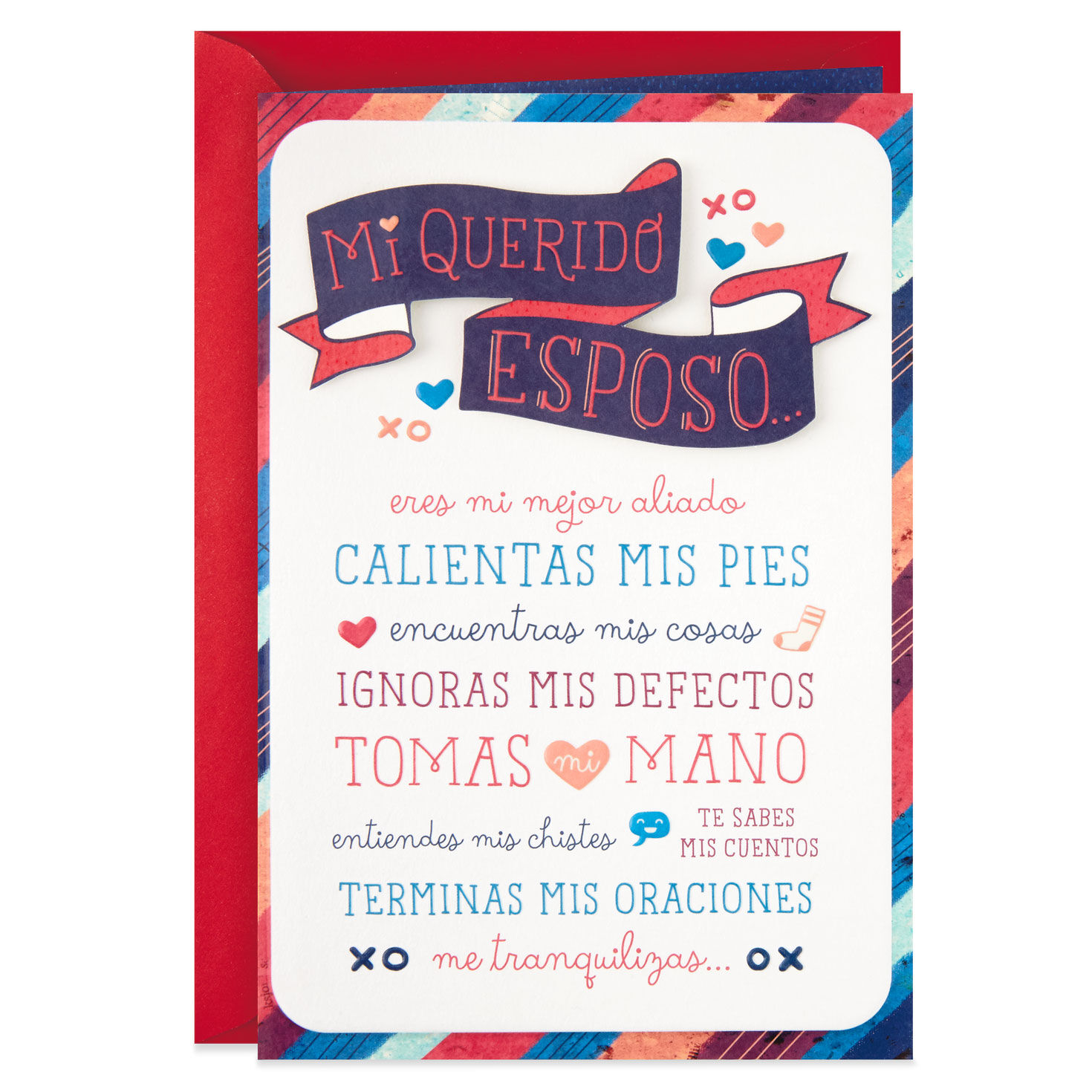Saying Husband To Be In Spanish: A Guide To Terms, Nuances, And Affectionate Expressions
Are you getting ready for a wonderful Spanish wedding, or do you just want to share your feelings for your future spouse in a beautiful, heartfelt way? Well, getting the words just right can make all the difference, really. You see, the Spanish language, with its rich history and many regional touches, offers a whole array of ways to talk about your "husband to be." This guide aims to help you find the perfect words for that special person in your life.
Sometimes, simply looking up a direct translation for "husband to be" does not quite capture the full feeling, you know? The words we choose carry different weights, different levels of closeness, and even different cultural hints. What sounds natural in one situation might feel a bit off in another. So, understanding these subtle differences is a big part of truly connecting with the language, too.
In this comprehensive guide, we will explore the various terms used for someone who will soon be a husband in Spanish. We will cover both the common, everyday expressions and the slightly more formal ones, giving you plenty of examples along the way. By the time you finish reading, you will definitely feel more comfortable and confident talking about your beloved future husband in Spanish, actually.
Table of Contents
- Understanding "Husband to Be" in Spanish
- Common Terms for Your Future Spouse
- Expressing "My Future Husband" Affectionately
- Regional Variations and What to Listen For
- Tips for Sounding Natural and Connecting Deeper
- Pronunciation Pointers
- Frequently Asked Questions About "Husband to Be" in Spanish
Understanding "Husband to Be" in Spanish
When you think about saying "husband to be" in Spanish, it is not just about finding one single word that fits every time, you know? It is more like picking the right tool for a particular job. The Spanish language, with its expressive nature, provides several ways to convey this idea, each with its own special feel. This means you have choices, which is pretty neat, actually.
The Importance of Context
The situation where you use a term for "husband to be" matters a great deal, in a way. Are you talking with close friends at a casual get-together? Or are you making a formal announcement to a larger group? Perhaps you are just writing a sweet note to your partner. Each of these moments might call for a slightly different word or phrase, so you really want to pick well.
For example, what you might say to your grandmother could be a bit different from what you would use with your best friend. This is a common thing in many languages, and Spanish is no exception. So, thinking about who you are talking to, and the setting, will guide you quite a lot, actually.
- Taco Bell Steakhouse Burrito
- Salvage Hunters Drew Pritchard
- Remote Iot Platform Ssh Key Raspberry Pi
- We Were Liars Cast
- Pete Davidson Tattoo Removal
Why Direct Translation Isn't Always Enough
A direct word-for-word translation can sometimes miss the true spirit of what you mean, that is the thing. The English phrase "husband to be" carries a specific sense of future commitment and a relationship stage. Spanish terms capture this, but they also bring in their own cultural layers. So, just plugging words into a translator might not give you the most natural or heartfelt expression, you know.
To truly sound like a native speaker, or someone who really gets the language, it is helpful to look beyond just one-to-one word swaps. You want to grasp the subtle feelings and common ways of speaking. This makes your communication much richer and helps you connect deeper with others, which is pretty cool, actually.
Common Terms for Your Future Spouse
Let's look at the words people most often use when talking about someone who will soon become a husband. These are the ones you will hear quite a lot, so they are a good place to start, in some respects.
Novio: More Than Just Boyfriend
The word "novio" is quite interesting because it can mean "boyfriend," but it also means "fiancé." This dual meaning can sometimes confuse people learning Spanish, yet it is very common. When a couple is engaged, especially in less formal settings, "novio" is often the term used for the man, and "novia" for the woman. It suggests a serious relationship that is heading towards marriage, you know.
It is a term that feels warm and personal, often used among friends and family. So, if you are planning a Spanish wedding, hearing or using "novio" for your future husband is completely normal. It really conveys that sense of a beloved partner who is on the path to becoming a husband, actually.
Usage and Examples
You might hear someone say, "Mi novio y yo nos casamos el próximo año," which means, "My fiancé and I are getting married next year." Or perhaps, "Presento a mi novio," when introducing their engaged partner to someone new. This shows how versatile the word is, really.
Here are a few more ways you might use "novio" for your husband to be:
- "Estoy tan feliz con mi novio." (I am so happy with my fiancé.)
- "Mi novio es la persona más amable." (My fiancé is the kindest person.)
- "Vamos a elegir el traje de mi novio." (We are going to choose my fiancé's suit.)
As you can see, it fits very naturally into everyday talk, you know.
When Novio Fits Best
"Novio" is often a good choice in informal and semi-formal situations. It works well with friends, family, and people you know fairly well. It carries a feeling of affection and closeness, so it is a good pick for expressing how you feel about your future husband. It is, like, a go-to word for many, actually.
It is also quite common in wedding planning conversations, too. People will often talk about "el novio" and "la novia" when referring to the couple getting married. So, it is definitely a word you will want to have in your vocabulary, in a way.
Prometido: The Engaged One
The word "prometido" (and "prometida" for a woman) comes from the verb "prometer," which means "to promise." This term directly translates to "fiancé" and very clearly points to someone who is engaged to be married. It is a bit more formal than "novio" when specifically referring to an engaged person, and it emphasizes the promise of marriage, you know.
If you want to be very clear that someone is your "husband to be" and that an engagement has taken place, "prometido" is an excellent choice. It leaves no room for doubt about the relationship status. This word, you know, really highlights the commitment that is already there, actually.
Usage and Examples
You could say, "Mi prometido y yo estamos planeando nuestra boda," which means, "My fiancé and I are planning our wedding." This usage clearly states the engagement. It is a solid, straightforward way to talk about your future husband, too.
Here are some other ways to use "prometido":
- "Quiero presentarles a mi prometido." (I want to introduce you to my fiancé.)
- "Mi prometido me dio un anillo precioso." (My fiancé gave me a beautiful ring.)
- "El prometido de mi hermana es muy amable." (My sister's fiancé is very kind.)
These examples show its clear and direct meaning, really.
The Formal Touch
"Prometido" tends to be used in more formal settings or when you want to be very precise about the engagement. It is a good word to use when making an official announcement, or when talking with people you do not know very well. It carries a sense of seriousness and commitment, which is important for such a significant life event, you know.
While "novio" is common and friendly, "prometido" adds that extra layer of official status. So, depending on the situation, you might choose one over the other, or even use them interchangeably if you feel it fits, actually.
Expressing "My Future Husband" Affectionately
Sometimes, you want to say "my future husband" with a bit more warmth or a longer, more descriptive phrase. Spanish offers some lovely ways to do this, letting you really pour your feelings into the words. These phrases often feel very personal and sweet, in a way.
Adding "Mi" for a Personal Touch
The simplest way to make any term for "husband to be" more personal is by adding "mi" (my) in front of it. So, "mi novio" or "mi prometido" already adds a layer of personal connection. It shows possession and affection, which is pretty common, you know.
This little word makes a big difference in how the phrase feels. It changes it from a general term to something specific to your relationship. So, always remember to add "mi" when you are talking about your own future husband, actually.
Descriptive Phrases
For those times when "novio" or "prometido" just do not quite capture everything you want to say, there are longer, more descriptive phrases. These really emphasize the "future" aspect and can sound very romantic, too.
Mi futuro esposo/marido
This phrase directly translates to "my future husband." "Esposo" and "marido" both mean "husband." "Esposo" is generally considered a bit more formal or common in some Latin American countries, while "marido" is very widely used in Spain and also in some parts of Latin America. Both are perfectly good choices, so you can pick the one you like best, you know.
Using "mi futuro esposo" or "mi futuro marido" is a very clear and loving way to talk about the person you are going to marry. It is a phrase that speaks of hope and plans, which is quite lovely, actually.
- "Estoy soñando con el día en que mi futuro esposo y yo nos casemos." (I am dreaming of the day my future husband and I get married.)
- "Mi futuro marido es el hombre más maravilloso." (My future husband is the most wonderful man.)
- "Le conté todo a mi futuro esposo." (I told everything to my future husband.)
These phrases really express that deep connection, you know.
El que será mi esposo/marido
This phrase means "the one who will be my husband." It is a bit more poetic and very romantic, often used to express deep affection and certainty about the future. It has a lovely flow to it and emphasizes the destiny of your relationship, actually.
This is a wonderful option for more intimate conversations or even in written form, like in a letter or a wedding vow draft. It sounds very heartfelt and special, you know.
- "Él es el que será mi esposo, mi gran amor." (He is the one who will be my husband, my great love.)
- "Estoy feliz de haber encontrado al que será mi marido." (I am happy to have found the one who will be my husband.)
This phrase, you know, truly captures a sense of a shared future, too.
Regional Variations and What to Listen For
Spanish is spoken in many countries, and just like any widely spoken language, it has regional differences. What is common in Spain might be slightly different in Mexico, or Argentina, or Colombia. These variations are part of what makes the language so rich and interesting, actually.
When it comes to terms for "husband to be," the main words like "novio" and "prometido" are quite universally understood. However, the frequency of their use, or certain nuances, can shift from one place to another, you know. Paying attention to these small differences can help you sound even more natural when you speak.
Spain vs. Latin America
In Spain, "novio" is very, very commonly used for both "boyfriend" and "fiancé." It is probably the most frequent term you will hear for someone who is engaged. "Prometido" is also used, but perhaps a bit less often in everyday conversation, or it might carry a slightly more formal weight, you know.
In many Latin American countries, "novio" is also widespread for both meanings. However, in some regions, "prometido" might be used with a bit more regularity to specifically indicate an engaged person, especially in more formal announcements. It really varies, so listening to local speakers is always a good idea, actually.
The phrases "mi futuro esposo" or "el que será mi marido" are generally understood and appreciated across all Spanish-speaking regions. They are descriptive and clear, so you really cannot go wrong with them, you know.
Local Expressions
While the core terms are pretty consistent, some regions might have very specific, informal, or endearing local expressions. These are often learned by being immersed in the culture and listening to how people talk. For example, in some places, you might hear a very casual term of endearment that implies future marriage, but it would not be a direct translation of "husband to be," you know.
If you are spending a lot of time in a particular Spanish-speaking area, try to listen to how locals refer to their engaged partners. This is the best way to pick up on those charming, localized phrases. It is a bit like learning slang, in a way, and it makes your Spanish sound very authentic, actually.
Tips for Sounding Natural and Connecting Deeper
Learning the right words is just one part of it. Using them naturally and with confidence is the next step. Here are some simple tips to help you sound more like a native speaker and really connect when you talk about your "husband to be" in Spanish, you know.
Listen to Native Speakers
One of the very best ways to learn how to use these terms correctly is to listen to people who speak Spanish every day. Pay attention to how they refer to their partners, especially if they are engaged. Watch Spanish movies, listen to music, or find podcasts. You will start to pick up on the subtle cues and preferred terms, actually.
Hearing the words in real-life conversations helps you understand their rhythm and context. It is a bit like absorbing the language, rather than just memorizing rules. So, immerse yourself as much as you can, you know.
Practice Makes Perfect
Do not be afraid to use the words! The more you practice saying "mi novio," "mi prometido," or "mi futuro esposo," the more natural it will feel. Start by using them in your thoughts, then try them out loud when you are alone, and then with friends or language partners, you know.
Making mistakes is a part of learning, so do not let that stop you. People generally appreciate the effort, and they will often help you if you stumble. The goal is to get comfortable, and that only comes with practice, actually.
Embrace the Nuances
Remember that Spanish is a language rich with nuance and emotion. Do not expect every word to have a perfect, one-to-one match with English. Instead, try to understand the feeling or the specific situation each Spanish term represents. This way of thinking helps you truly grasp the language, you know.
The subtle differences between "novio" and "prometido" are not obstacles; they are opportunities to express yourself with greater precision and warmth. So, enjoy exploring these linguistic layers, actually. It is a really rewarding part of learning Spanish.
Pronunciation Pointers
Knowing the words is great, but saying them clearly makes a huge difference. Good pronunciation helps you communicate effectively and confidently. Let's touch on a few things to keep in mind when you say these terms for your "husband to be" in Spanish, you know.
Key Sounds to Master
For "novio," pay attention to the "v" sound, which is often softer in Spanish, more like a "b" sound. The "o" sounds
- Carly Jane Leaks
- Disney World Annual Pass
- Daisy Edgar Jones Movies And Tv Shows
- Kelsey Chow Movies And Tv Shows
- Riley Green Wife

My Husband in Spanish | Spanish to Go

For My Husband Happy Fathers Day Quotes In Spanish. QuotesGram

How To Say Your Husband In Spanish The Exemplary Husband (spanish